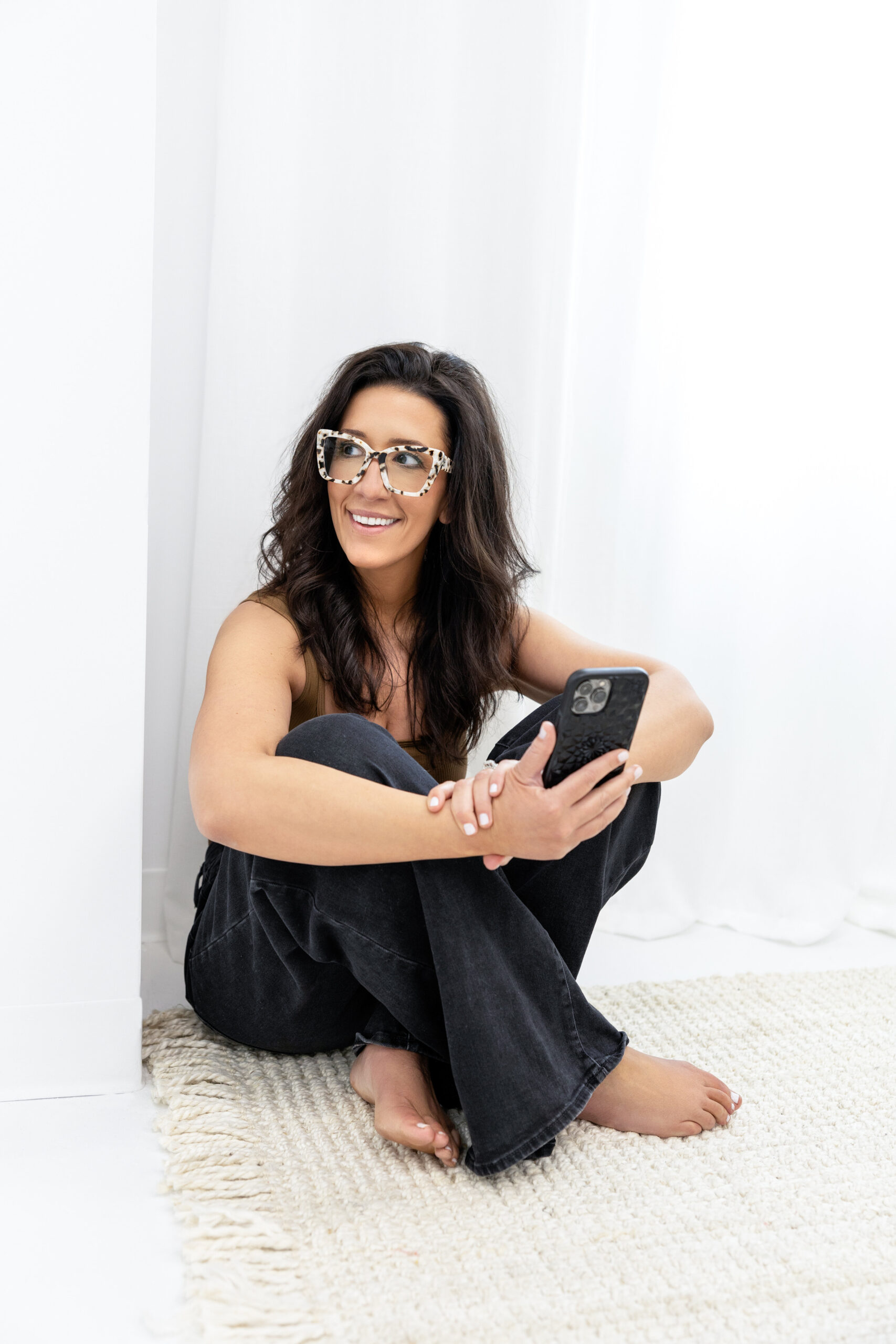August 16, 2025
How to Create a Memorable Brand That Lasts
Podcast Episode: From Font Nerd to Agency Owner: Building an Authentic Brand with Lizzy of White Point Creative
What if I told you that the person who transformed my entire brand identity was once told by her college professor that her work “wouldn’t cut it” in the real world?
Meet Lizzie, the 29-year-old founder of White Point Creative, a multiple six-figure agency that specializes in brand refreshes for online entrepreneurs. Her story isn’t just inspiring – it’s a masterclass in how authentic community building and strategic positioning can create extraordinary success.
The “Below Average” Student Who Refused to Stay Average
Lizzie’s journey started in the most unlikely place: failure. As a graphic design student, she was struggling. Badly.
Her college professor’s brutal assessment: “This isn’t gonna cut it. You’re not gonna make it if this is what you produce out in the real world. You won’t even get hired.”
Instead of crushing her spirit, this moment became her catalyst. But here’s what makes Lizzie’s story different – she didn’t try to prove her professor wrong through spite or anger. She got honest about her effort and decided to change course entirely.
The Boston Experiment That Changed Everything
After graduating and moving to Boston with her college sweetheart, Lizzie found herself feeling directionless. Coming from a blue-collar, military family, she had no roadmap for what to do next.
So she freelanced. Through Creative Circle, a talent agency, she landed contracts with major brands like Puma, Saucony, Keds, and Merrell.
The breakthrough moment came when she asked herself: “What if I created something of my own, but with only the parts that I loved?”
This wasn’t just about starting a business – it was about intentional curation of her work life. She wanted to take everything she enjoyed from three years of agency work and eliminate everything she hated.
The Community Secret That Fuels Everything
When I asked Lizzie what gave her the self-belief to take that first entrepreneurial leap, her answer stopped me in my tracks:
“I surrounded myself with people who were my biggest cheerleaders… people who challenge you and cheer you on.”
She calls them “front row people” – those who will stand up mid-audience and clap for you, hold you when you cry, then pat you on the back and say “okay, now go.”
This isn’t just feel-good advice – it’s strategic business building. Lizzie’s community includes:
- Family who believed in her from day one
- A husband who challenges her ideas while supporting her vision
- Business mentors like Laura Higgins who’ve guided her for years
- Clients who’ve become genuine friends
Why She Chose Coaches and Educators (And Why It Matters)
Lizzie could have taken her design skills anywhere. She could have worked with Fortune 500 companies, tech startups, or retail brands. Instead, she chose to focus on coaches and online educators.
Her reasoning is brilliant: “I like working with people who are fired up about serving someone else other than themselves.”
But there’s a deeper strategy here. Coaches are constantly pouring into their communities, often forgetting they need to be lifted up themselves. Lizzie positioned her agency as the “front row” for her clients – not just during the project, but for years afterward.
This approach creates:
- Deeper client relationships
- Higher lifetime value
- Stronger referral networks
- More meaningful work
The Branding Framework That Actually Works
Here’s where Lizzie gets nerdy (and brilliant). Her definition of branding isn’t about logos or color palettes – it’s about “creating a memorable connection by converting a business’s unique promise into something unforgettable.”
Step 1: Find What’s Truly Unforgettable About You
“We all have something unique,” Lizzie explains. For some, it’s their approach to ethics in marketing. For others, it’s their unconventional background or perspective.
The key is being honest about what makes you different and being okay with “tooting your own horn.”
Step 2: Make It Memorable
This is where most people get stuck. They look at what everyone else is doing and try to fit in.
Lizzie’s advice: Stop looking at your competition and start looking at your industry from the outside. “The lifeguard has the best perspective in a pool environment, not standing in the center of the pool, but standing outside of it.”
Step 3: Create an Experience
Even digital businesses create experiences. When someone visits your website, reads your emails, or consumes your content – that’s all part of your brand experience.
Lizzie uses Chick-fil-A as her go-to example: Their “my pleasure” response, cow appreciation day, being closed on Sundays – these aren’t accidents. They’re intentional brand experiences that make the company memorable.
The Blind Spot Problem Every Entrepreneur Faces
Here’s something that blew my mind: Lizzie is currently going through her own brand refresh and outsourced it to another agency.
Think about that. She’s a branding expert with a team of designers, and she still hired someone else to rebrand her own business.
Her explanation: “Our business sits in our own personal blind spot… I am too far in my own brand.”
This is why so many entrepreneurs struggle with their messaging, positioning, and brand identity. You can’t read the label from inside the bottle.
The Growth Challenge That’s Actually Common
Despite building a multiple six-figure agency, Lizzie shared something refreshingly honest: “I can barely take a vacation with the way my business is currently set up.”
She discovered she was the bottleneck in her own business. Her 10-person team was like “a 10-lane highway” that merged into one lane (her) before anything could go out the door.
The lesson here: Success at one level creates new problems at the next level. Growth isn’t just about scaling revenue – it’s about scaling systems, delegation, and trust.
Why Trends Are a Waste of Your Time
When I asked about branding trends, Lizzie’s response was perfect: “Why spend hundreds of thousands of dollars or even just 10 hours of time on something that will soon expire?”
Instead of chasing trends, she focuses on what’s actually happening in the market:
- A shift toward quality over quick/cheap/easy
- Increased focus on storytelling
- Higher production value in content
- More separation between price points
The takeaway: Build for longevity, not for what’s popular this month.
The Experience Exercise That Changes Everything
Want to improve your brand? Lizzie suggests making it a game:
Pick a company you admire (she uses Chick-fil-A) and map out every touchpoint of their customer experience:
- How does their staff interact with customers?
- What makes their visual identity memorable?
- What values do they stand by, even when it costs them money?
- How do they surprise and delight people?
Then ask: What could I do in my business that would have a similar impact?
The Future of White Point Creative
Lizzie’s agency is at an inflection point. They’ve reached the limit of their current model and need to decide: blow through the ceiling or find a different way around it.
Her solution: Adding “self-sustaining” offerings (translation: digital products and courses) that allow her to scale without duplicating her entire team.
This is smart business strategy. By creating products she can “pour her heart into once” and then market repeatedly, she’s building multiple revenue streams while maintaining quality.
What This Means for Your Business
Lizzie’s story offers several key lessons for entrepreneurs at any stage:
For Beginners:
- Your background doesn’t determine your future
- Community is more important than credentials
- Focus on what you love, not what you think will make money
For Growing Businesses:
- You might be the bottleneck in your own growth
- Your business sits in your blind spot – get outside perspective
- Don’t get too precious about what you’ve built
For Everyone:
- Branding is about experience, not just visuals
- Authenticity beats perfection every time
- Success creates new problems – that’s normal
The Permission to Be Imperfect
Perhaps the most powerful part of Lizzie’s story is this: she built a multiple six-figure agency while admitting she doesn’t feel special or extraordinary.
Her exact words: “At my core, I don’t feel special. I feel like for other people who are like, I don’t feel special, that’s me too.”
This is permission to start where you are, with what you have, feeling exactly how you feel right now.
You don’t need to feel destined for greatness. You don’t need to have it all figured out. You just need to be willing to:
- Surround yourself with people who believe in you
- Focus on serving others well
- Be honest about what makes you different
- Keep iterating and improving
The Bottom Line
Lizzie’s journey from “below average” design student to agency owner isn’t about overnight success or natural talent. It’s about consistent effort, strategic thinking, and the courage to be authentically yourself in a world that rewards conformity.
Your brand isn’t your logo or your color palette – it’s the unforgettable experience you create for people who interact with your business.
Stop trying to be like everyone else in your industry. Start figuring out what makes you memorably different.
The world doesn’t need another copy. It needs the original you.
Ready to dive deeper into building your digital empire? Subscribe to Beyond the BS and follow me on Instagram @the_no_bs_newyorker. Want to connect with Lizzie? Find her on Instagram @white.point.creative and sign up for her monthly newsletter at whitepointcreative.com for free resources and behind-the-scenes insights.








leave a comment!
Comments